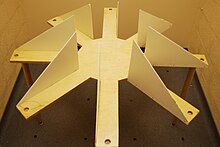Radial maze
As Radial Maze an experimental arrangement for learning experiments with animals is known that a maze (ger .: maze is modeled).
overview
The arrangement consists of a mostly eight-armed beam-shaped board, at the ends of which there is food in some arms. The test animal is trained to always find food in the same arm. From the number of test runs until the greatest possible reliability in achieving the specified behavior, conclusions can be drawn about the inheritance of learning behavior, for example by comparing different breeding lines .
The learning success in this test depends on the size of part of the moss fiber projection in the hippocampus .
swell
- ↑ WE Crusio & H. Schwegler (2005) Learning spatial orientation tasks in the radial-maze and structural variation in the hippocampus in inbred mice. Behavioral and Brain Functions 1 (3), http://www.behavioralandbrainfunctions.com/content/1/1/3
